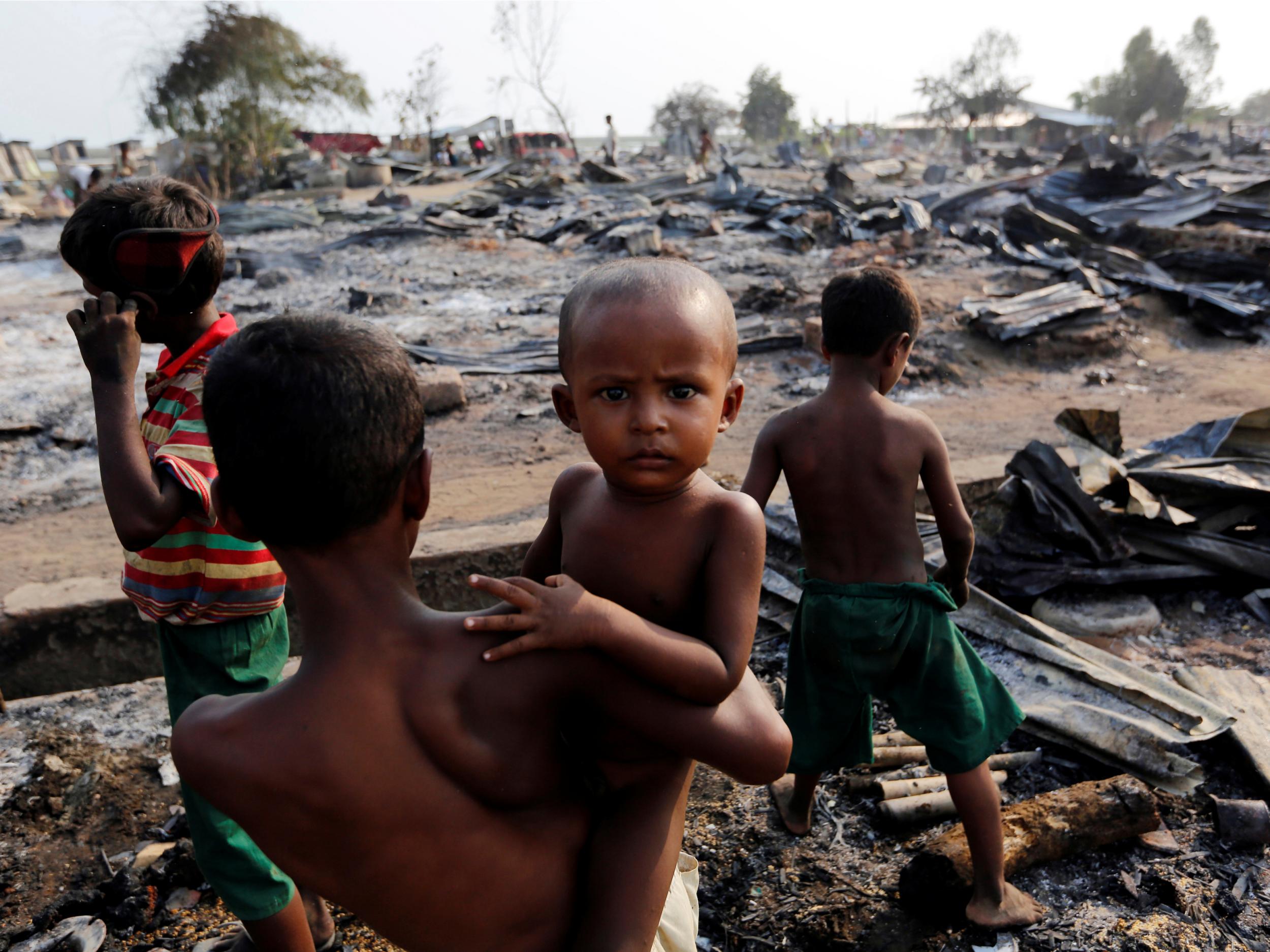Burma's Rohingya Muslims speak of massacres and rape as government denies genocide
'They burned many people. They burned them in front of my house.'
Your support helps us to tell the story
From reproductive rights to climate change to Big Tech, The Independent is on the ground when the story is developing. Whether it's investigating the financials of Elon Musk's pro-Trump PAC or producing our latest documentary, 'The A Word', which shines a light on the American women fighting for reproductive rights, we know how important it is to parse out the facts from the messaging.
At such a critical moment in US history, we need reporters on the ground. Your donation allows us to keep sending journalists to speak to both sides of the story.
The Independent is trusted by Americans across the entire political spectrum. And unlike many other quality news outlets, we choose not to lock Americans out of our reporting and analysis with paywalls. We believe quality journalism should be available to everyone, paid for by those who can afford it.
Your support makes all the difference.Rohingya Muslims have described horrific rapes, massacres and atrocities at the hands of Burmese forces as the government continues to deny allegations of genocide.
Tens of thousands of people from the ethnic minority have been fleeing into Bangladesh to escape the violence, described as anti-terror “clearance operations” by the President’s office.
A young mother told the Associated Press how soldiers raided her village in Rakhine state and set light to the thatched homes before shooting anyone trying to flee into surrounding fields.

“They drove us out of our houses, men and women in separate lines, ordering us to keep our hands folded on the back of our heads,” says 20-year-old Mohsena Begum.
She said that when about 50 people had been gathered together, the soldiers, along with a group of local men, pulled four leaders of Caira Fara village from the crowd and slit their throats.
Ms Begum, who fled to Bangladesh with her son, said her husband was among those killed in the ensuing violence, and that she was also raped.
In a separate attack, a 25-year-old Rohingya woman told Time magazine how troops torched her village, and that one soldier snatched her eight-year-old son away and threw him back into their burning home.
The Rohingya have faced persecution for decades in Buddhist-majority Burma, where most are regarded as immigrants from Bangladesh and denied citizenship.
This latest outbreak of violence was triggered by attacks on guard posts near the Bangladesh border in October that killed nine police officers, with the government launching a huge sweep through Rohingya majority areas in Rakhine state after blaming “sympathisers” of the minority for the attacks.
Ground troops and helicopter gunships have been used in the operations, which have forced up to 30,000 people to abandon their homes, according to the UN.
Satellite images analysed by Human Rights Watch showed 1,250 structures were destroyed in November in Rohingya villages.
Osman Gani, an Arabic teacher, fled after his village was attacked on 11 November.
“They came and killed mercilessly. They burned our homes,” he told AP after fleeing to Bangladesh. “No one was there to save us.”
As he fled north from Gouzo Bil, he used his mobile phone to film destruction in other Rohingya villages he passed through. In some, the blackened remains of what appear to be children can be seen amid the wreckage of homes.
“They (the army) oppressed us and fired at us from aircraft,” Mr Gani said. “People were killed in front of my house. They chased the girls and gunned them down. And they burned many people. They burned them in front of my house.”
The Burmese government called an emergency meeting of the Association of Southeast Asian Nations (Asean) as regional tensions deepen over the crisis.
Malaysian Prime Minister Najib Razak lashed out at leader Aung San Suu Kyi for allowing “genocide” last week, speaking before thousands of angry protesters in Kuala Lumpur.
The Nobel Peace prize winner’s party won the country’s first democratic elections in a generation last year but she has been criticised over the military crackdown by the UN, whose special adviser said it had “caused frustration locally and disappointment internationally”.

The UN’s Special Rapporteur on human rights in Burma, Yanghee Lee, said that instead of opening impartial investigations into human rights abuses, “the Government has mostly responded with a blanket denial”.
Ms Suu Kyi has accused the international community of stoking unrest over the reported killings and said refugees and the media were “exaggerating” incidents “so that everything seems worse than it really is”.
“It doesn’t help if everybody is just concentrating on the negative side of the situation, in spite of the fact that there were attacks on police outposts,” she said in a recent interview on Singapore’s Channel News Asia.
State media report almost 100 people have been killed – 17 soldiers and 76 suspects – in the army operation in Rakhine that followed the border post attacks on 9 October.
Advocacy groups put the death toll in the hundreds, but foreign journalists and independent investigators have been barred from visiting the area to verify the figures.
Much of Rakhine has been closed to outsiders, including reporters, since the violence began but former UN Secretary General Kofi Annan, leader of a commission formed to investigate the situation in the state, was expected to hold a press conference on its findings this week.
Meanwhile, the Burmese government has sent its own “commission” to villages reported to be the scene of massacres in western media.
The president’s office sent out a press release on Tuesday claiming residents of Kyetyoepyin in Maungtaw, the site of alleged rapes and killings of Muslim children, told state investigators “the claimed atrocities did not happen”. The names of the villagers or any details of the alleged interviews were not released.

Join our commenting forum
Join thought-provoking conversations, follow other Independent readers and see their replies
Comments